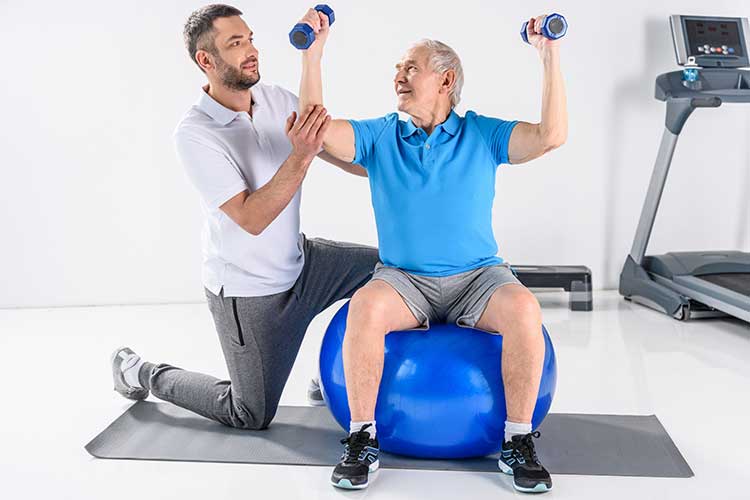Is your passion for sports and healthcare? Do you love working with athletes and helping them recover from injuries? If so, you might be interested in pursuing a career as a sports and rehabilitation therapist. This type of therapy involves working with athletes to help them recover from injuries and return to their peak performance. If you’re interested in learning more about how to become a sports and rehabilitation therapist, read on for some tips and advice.
1. Education and Training:
To become a sports and rehabilitation therapist, you will need to complete a bachelor’s degree in a related field, such as exercise physiology or kinesiology. You might also consider pursuing a master’s degree in sports rehabilitation or physical therapy. During your education, you will learn about anatomy, kinesiology, exercise physiology, and rehabilitation techniques.
Associates Degree Program
If you have graduated high school and want to pursue a career in this field, consider enrolling in an associate’s degree program. An AA degree program is shorter than a bachelor’s degree and more affordable. It also allows for more flexibility regarding when classes can be offered and completed.
Bachelors Degree
In some cases, where you are required to have a bachelor’s degree as a minimum qualification, you can also get into the field by acquiring a bachelor’s degree. For example, if you want to be an athletic trainer working in an acute care setting (such as a hospital), then it is likely that having a four-year Bachelor of Science degree would be required.
On the other hand, if you want to work as an occupational therapist or physical therapist in long-term acute care settings such as nursing homes or skilled nursing facilities, most positions will require at least two years of experience and possibly even certification before hiring new graduates.
The same goes for many jobs as well: If someone wants to work at their local center but doesn’t have any experience in sports and rehabilitation therapy, then they would probably only be considered for entry-level positions such as assistant or associate athletic trainers or massage therapists instead of being able to apply for jobs directly related
2. Gain Experience:
In addition to completing your education, gaining hands-on experience is essential when pursuing a career in sports rehabilitation. Consider doing an internship or working as an assistant to a licensed therapist to gain experience and insight into the field. You can also volunteer your time with sports teams or athletes in your community to get experience working with athletes in a sports setting.
3. Obtain Certification and Licensure:
You must be certified and licensed to work as a sports and rehabilitation therapist. The requirements for certification and licensure can vary by state, so research the requirements in your area. You will likely need to complete an exam and meet certain education and experience requirements to become certified and licensed.
4. Networking:
Building a network of connections is important in any career, including sports rehabilitation. Attend conferences, workshops, and seminars to connect with other professionals in the field. Join professional organizations and engage with other professionals on social media to stay up-to-date on trends and opportunities in sports rehabilitation.
5. Stay Current:
Sports rehabilitation is constantly evolving, so staying up-to-date on new techniques and industry advancements is crucial. Attend continuing education courses and read industry publications to ensure you provide the most effective treatment to your patients. Consider pursuing additional certifications or specializations to stay current and advance your career.
A Comprehensive Guide To A Career In Sports Therapist
The job of a sports and rehabilitation therapist is to help injured people recover from the injury and return to their normal routine. In this role, therapists provide manual therapy techniques, therapeutic exercises, biomechanical assessments and other treatment modalities. They also work with athletes to prevent injuries by improving their performance and preventing overuse syndromes or soft tissue injuries. They are responsible for diagnosing patients’ issues, devising treatment plans based on assessment results and administering therapies accordingly.
There are multiple ways to become a sports and rehabilitation therapist. You need to choose a degree program that suits you best depending on your experience, area of interest, location, etc.
You can become a therapist with an associate’s degree or a bachelor’s degree. Some schools offer both options for aspiring therapists to pursue their desired career path quicker than the other one.
To get into the field by acquiring a bachelor’s degree is also another great option but it may take more time than what you have expected. If you already have some experience in this field like working as an athletic trainer or assistant athletic trainer in high school or college level then pursuing education at graduate level may not be necessary for you if all you want is just certification in order to work as an athletic trainer/rehabilitation technician in professional sports teams or hospitals around your area while getting paid poorly compared with other occupations related medical fields such as doctors and nurses who earn much higher salary compare theirs counterparts in other areas of expertise such as physical therapy, occupational therapy, speech language pathology etc…
Getting Certified
A certification is not necessary to land a job, but it will give you an edge over your competition. Certification shows employers that you have the skills and training necessary for the job. It also gives employers peace of mind that their employees are competent enough to handle their clients’ injuries, which can be a big bonus for some employers.
Therapists need to have various skills such as good communication skills, warm personality, observational skills and an excellent understanding of anatomy and physiology. Good listening skills are important in the field of sports therapy. It is very important that therapists listen carefully to what their patients tell them.
A therapist should be able to understand the problems faced by athletes and identify their needs based on what they have told him/her. This will help him/her plan treatment programs accordingly according to the requirements of each athlete.
Brush Up On Your Skills
Therapists should possess strong communication abilities as they need to communicate with a lot of people during their career – athletes (or coaches), families, other healthcare professionals etc., so it’s important for them to be able to talk with all kinds of people with ease and confidence so that they can gather information from them about their patients’ condition or injuries which will help them diagnose better in future sessions too.
Conclusion
If you have a passion for helping others and want to become a sports and rehabilitation therapist, the first step is to get an education. You can choose from various schools that offer accredited degree programs in this field. If you already have a bachelor’s degree, you can enroll in an associate program or get certified by taking additional classes. Once you have acquired the necessary qualification and experience, it’s time to look for jobs as there are many opportunities available in different parts of the world!





